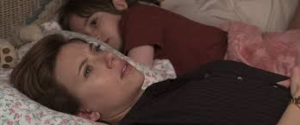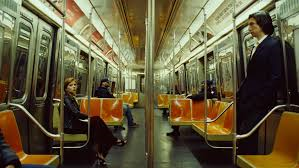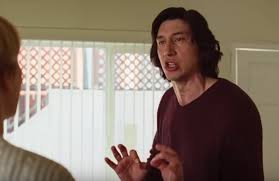Movie Review: Marriage Story

The latest film from writer-director Noah Baumbach is a wonderfully-acted and deeply affecting drama which examines the downward-spiraling marriage between a successful theatre director in New York City and his actress wife. In the opening scene we listen as Charlie (Adam Driver) and Nicole (Scarlett Johansson) read things they like about each other for the purposes of a relationship mediation. The thoughts expressed inform us of how well they know their respective strengths and habits. She remarks upon his self-sufficiency and how he enjoys being a dad. He observes how she always has a cup of tea in her hand, which she never finishes, and also has a fiercely competitive streak. The mediation does not eventuate when an embarrassed Nicole refuses to read aloud her meditations on her spouse. Shortly after this, Nicole is offered a starring role in a television pilot in Los Angeles and moves back there with their son Henry (Azhy Robertson). From Charlie’s perspective, this is merely a temporary arrangement and he continues to entertain hopes that the split can be as amicable as possible. Nicole also wishes for this, but, with the best will in the world, the divorce process they enter quickly becomes toxic as accusations are dished out and lawyers enter the fray.

This is one of the central themes which the somewhat ironically-titled Marriage Story explores – how and why do two people who have loved each other move from positions of general reasonableness to extremes of anger and frustration. Baumbach carefully points to the relatively moderate dispositions of both husband and wife. Anxious to avoid a courtroom battle over the custody of their son, Charlie and Nicole seek to find a middle ground which they hope will obviate the need for the more conventional (and sometimes pernicious) methods of separation. An early scene – not bereft of some incisive humour – has Nicole attempting to serve Charlie with divorce papers in as delicate a fashion as possible. There is some terrific support here from her zany Mom (Julie Hagerty) who obviously has a soft spot for Charlie. The effects on the extended family are alluded to when Nicole tells her that she can no longer be simply ‘friends’ with Charlie. Baumbach’s screenplay constantly reminds us of how the dynamic of relationships change as the divorce process is worked through. When Nicole decides to hire a lawyer by the name of Nora Fanshaw (Laura Dern), a point of no return quickly beckons on the horizon. In – perhaps – Johansson’s best scene in the film, Nicole explains to Nora how she met Charlie and what their life together was like. A former teen actress, the still-young woman feels that her husband never afforded her the opportunity to move back to the west coast to pursue her own acting ambitions. He ‘didn’t see me’ she remarks…’I need to find my own piece of earth.’ For Charlie too the engagement with the legal process throws up difficulties. An appointment with a brash lawyer (Ray Liotta) who charges almost a thousand dollars an hour brings home the enormity and sheer burden of the proceedings to follow. And the emotional strain of the divorce is one which they both feel intensely; as one ancillary character puts it ‘a criminal lawyer sees bad people at their best, whilst a divorce lawyer sees good people at their worst.’

Baumbach has visited this subject matter before by way of his excellent 2005 film The Squid and the Whale which also examined the fractious effects that divorce can have on other family members. Having gone through a divorce himself (from actress Jennifer Jason Leigh), the director can certainly lay claim to possessing more than a little personal knowledge on the issue. Striving at all times to remain civil and courteous towards each other, Charlie and Nicole are not however entirely averse to some of the mud-slinging which their respective lawyers attempt to advocate. In one of the film’s more touching performances, an elderly family lawyer (played by the great Alan Alda) tries to promote a more conciliatory approach. There are no winners in this kind of battle he advises the increasingly-despondent Charlie. And yet he freely admits to having gone through three divorces himself; he expects his fourth marriage will stick simply because he won’t live forever. The absurdity which surrounds the institution could hardly be more evident in this respect.

Baumbach’s often witty and on-the-money script and astute direction offers his lead actors an ample opportunity to flex their acting muscles and Driver and Johansson more than rise to the occasion. I’ve already referenced a previous scene between Johansson and Laura Dern in this regard, but a later confrontation between her and Driver is slightly shaded by the BlacKkKlansman actor as he literally breaks down at her feet having declared his desire that she might die. The two leads have never been better and Driver – for his part – demonstrates why he is considered one of the most gifted actors of his generation. Elsewhere, in support, Laura Dern steals every scene she is in and Ray Liotta and Alan Alda also shine in their respective parts. Newcomer Azhy Robertson could hardly be better as Henry – the eight-year-old son who finds himself an unwitting participant in his parents’ divorce proceedings. There are more than a few shades of 1979’s Kramer vs. Kramer here, but Baumbach has also managed to imbue the piece with many modern sensibilities and his take on the entire process certainly emanates from a deeply-held perspective. A modern drama of the very highest order which benefits from the tour-de-force performances of its leads.
Rating: A